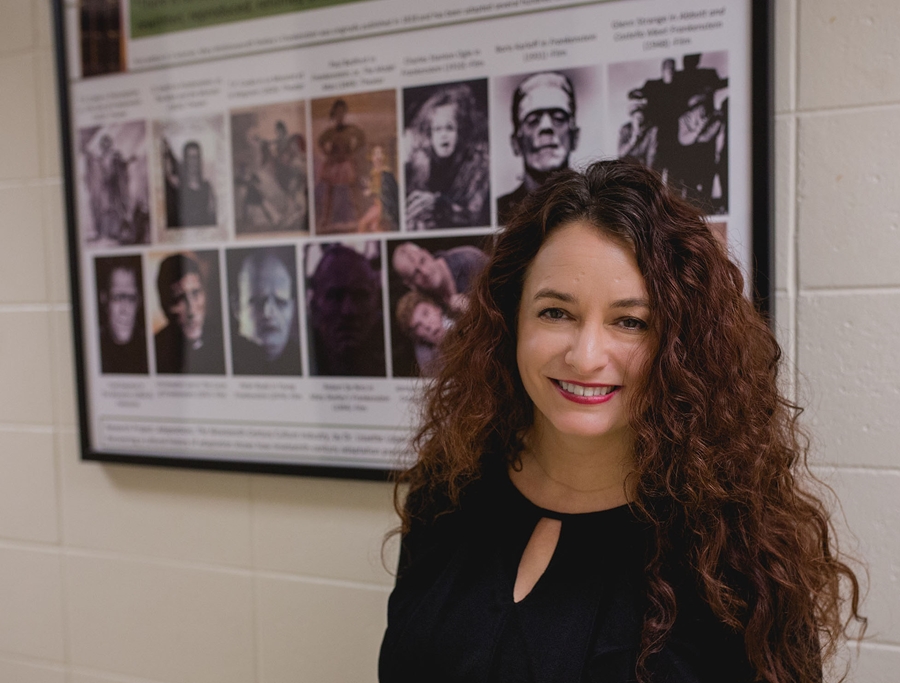
Earlier this month, students in "Frankenstein: A Multimedia Cultural History," a course offered by the Department of English and taught by assistant professor Lissette Lopez Szwydky, Ph.D., exhibited their final projects in a poster fair that delighted visitors with its wide range of topics and scope of creativity.
The course, coded as ENGL 3743/4593/4743/4933, is promoted by the Department of English as an opportunity to study the Frankenstein story "from novel to stage to political cartoons to film to television to graphic novels to children's and young adult fiction" and, further, to "discuss the historical contexts of the [Frankenstein] adaptations in relation to media history and their respective socio-political contexts."
Along with the original Frankenstein novel written by Mary Wollstonecraft Shelley, students in the class read several book-based adaptations of Frankenstein, including Lita Judge's Mary's Monster, Kiersten White's The Dark Descent of Elizabeth Frankenstein, Ahmed Saadawi's Frankenstein in Baghdad, and graphic novels including Gris Grimly's Frankenstein and Victor LaValle's Destroyer.
Students are also assigned theoretical and critical readings that focus upon adaptation theory and gender and sexuality studies, as well as texts in a variety of other media such as classic films from Universal such as James Whale's iconic Frankenstein and Bride of Frankenstein, Kenneth Branagh's film Mary Shelley's Frankenstein, science fiction films including Ex Machina and Splice, the TV series Penny Dreadful, and many more Frankenstein adaptations.
The course is open to undergraduate students studying in multiple disciplines, including English, communication, education, history, theatre, art, and other areas.
Szwydky, whose areas of specialization include Romantic and Victorian literature, adaptation studies, gender studies, comics and graphic novels and new media, said she enjoys teaching the course because "Frankenstein is a great example of a culture-text that is regularly adapted, rewritten, recycled, and reimagined.
"Everyone knows Frankenstein, even if they have never read Frankenstein," she said. "The story's cultural history across forms and media shows how much adaptation and transmediation are central to the functions of storytelling, cultural production, and history."
Szwydky's forthcoming book, Transmedia Adaptation in the Nineteenth Century (Ohio State University Press, 2020), includes extensive discussions of Frankenstein's transmedia cultural history alongside many other culture-texts that are widely known and regularly adapted across forms and media.
In Szwydky's course, students were given the opportunity to choose from many forms of final projects including composing research papers, writing original adaptations such as poetry series and short stories, creating original plays, developing K-12 lesson plans, developing multimedia projects, and more.
At the Dec. 9 poster fair, the following students showed off poster presentations adapted from their final projects:
- Josie Bates displayed "Frankenfather"
- Jonathan Brown displayed "Frankenstein for 8th Graders"
- Cathleen Criss displayed "Franken Class"
- Blakely Davis displayed "Politically Charged"
- Allie Dill displayed "Frankenstein in Nine Weeks"
- Hannah-Grace Dobbs displayed "The Mind of the Monster"
- Kennedy Fuller displayed "Frankenstein: The Romantic Musical"
- Jonathan Hash displayed "Pieces of Me, or, Frankenstein & the Soldier"
- Claire Hutchinson displayed "She's Alive: A Comic Book Adaptation"
- Aja Jefferson displayed "Voices Unheard"
- Courtney Kasch displayed "Voices of the Voiceless: Exploring the Characterization and Legacy of Safie and Margaret Saville in Frankenstein and Its Adaptations"
- Seth Keller displayed "Chimecha"
- Chase Laird displayed "Freudenstein"
- Hope Ritchey displayed "Generations of Frankenstein"
- Georgia Roberts displayed "Adapting a Culture of Creativity: 11th Grade English Class Lesson Plan"
- Ariana Robles displayed "Continuously Mending Frankenstein"
- Emily Walker displayed "Monster of the Week"
- Morgan Walker displayed "The Monster I Made"
- Evan Wilkins displayed "Franken-Lesson"
- William Zurborg displayed "Breaking Frankenstein"
Contacts
Leigh Sparks, assistant director of graduate programs
Department of English
479-575-5659, lxp04@uark.edu